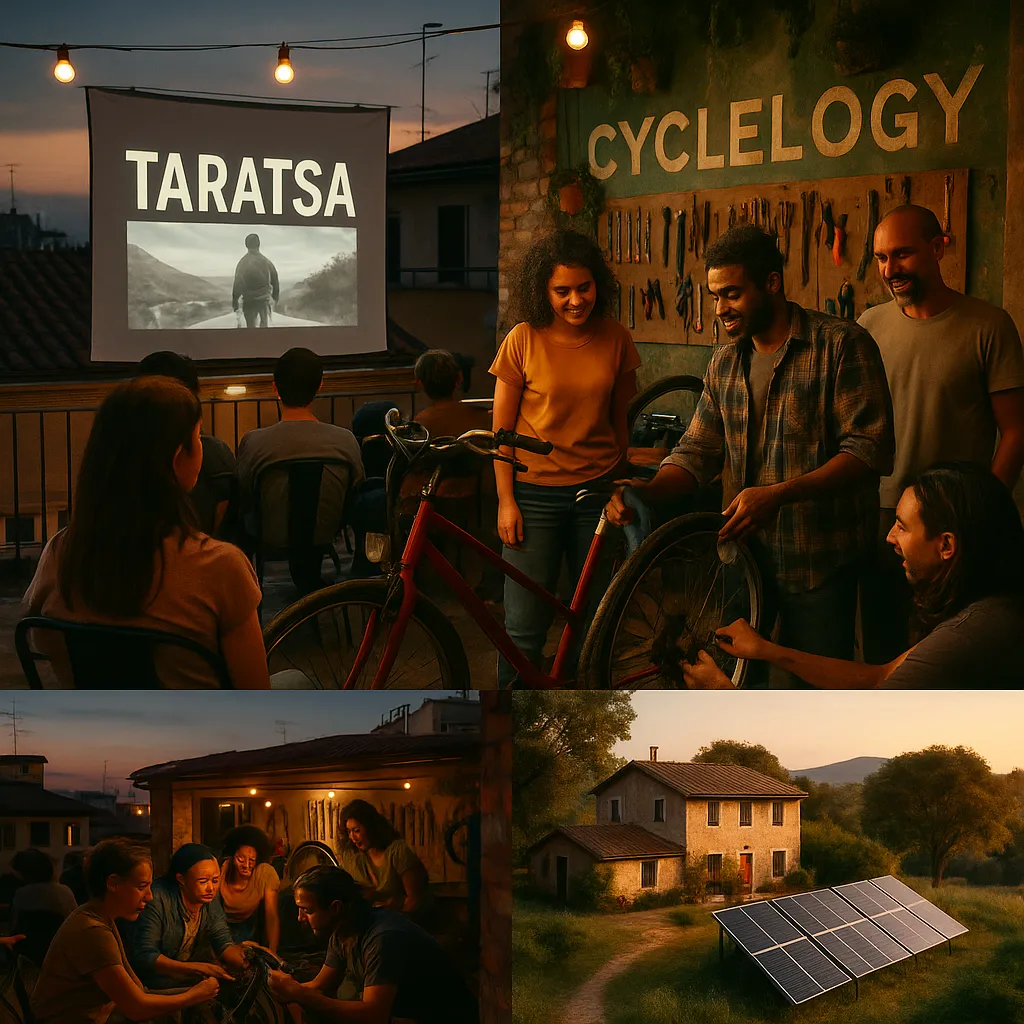In 2025, as debates over migration continue to dominate headlines, some of the most meaningful integration happens far from parliaments and policy rooms. It takes shape in places that are overlooked on official maps—on rooftops, in bike shops, and among olive trees. That’s where you’ll find Taratsa, Cyclelogy, and The Getaway Place—three unique community spaces making inclusion not just possible, but tangible.
They don’t follow a blueprint. They don’t ask for papers. They don’t fit into easy categories. But what they offer—safety, expression, rest—can be life-changing.
Taratsa: A Rooftop Platform Overlooking the Borderlands
High above Thessaloniki’s dense streets, Taratsa is more than a venue—it’s a stage for shared stories. What started as an experimental theater on a rooftop has evolved into a full-time cultural space that hosts music, film, performance, and open forums.
In 2025, Taratsa launched the Stories from the Borderlands festival. It brought together migrant filmmakers, Greek musicians, and international poets for a night of border-crossing creativity. Under the stars, short films by refugee youth played next to live traditional music and spoken-word performances.
Taratsa is one of the rare places in Greece that openly welcomes undocumented youth—not with charity, but with workshops in writing, media, and photography. It’s a space where people come not just to watch, but to create.
When Thessaloniki saw an influx of displaced families in 2023, Taratsa became a spontaneous hub for distributing food and organizing legal clinics. Two years later, it’s back to focusing on the arts, but the urgency hasn’t left. Its strength lies in its ability to shift without losing its soul.
Cyclelogy: Where Tools, Coffee, and Stories Intersect
Travel west to Bologna, and you’ll find Cyclelogy, a bike repair shop that doubles as a social lab. On the surface, it looks like a trendy garage—plants hanging from the ceiling, colorful murals, racks of refurbished bikes. But its heart beats through its mission: to train and employ refugees and migrants.
In 2025, Cyclelogy’s team includes mechanics from Afghanistan, Eritrea, and Syria. They join a six-month apprenticeship program that teaches bicycle mechanics, conversational Italian, and urban navigation skills. This isn’t just job training—it’s orientation into a new life.
Cyclelogy’s Ride & Repair events have become something of a local phenomenon. Every week, newcomers and locals cycle through Bologna together, fixing bikes along the way and ending with shared meals in city parks. These rides blur boundaries—between locals and migrants, between work and play.
One student from Bologna put it perfectly: “I came for the bike tools, but I stayed for the conversations. It’s the only place in the city where nobody asks where you’re from before asking your name.”
The Getaway Place: Healing in the Hills
Far south, in rural Spain, lies The Getaway Place, a retreat surrounded by olive groves and solar panels. Launched in 2021 by a group of queer artists and migrant activists, it was built as an answer to burnout, displacement, and digital overwhelm.
By 2025, it has become a sought-after sanctuary. One of its signature offerings is the Silent Histories Residency, a four-day retreat designed for migrant women to rest, write, and reflect in solitude. There are no deadlines, no audience—just a fire circle at the end where silence is respected as much as speech.
This is rest as resistance. And in a world where marginalized people are constantly asked to prove their value, The Getaway Place flips the script. It offers space without performance, care without conditions.
Everything here—energy, food, waste—is managed sustainably. Digital devices are optional but discouraged. The real currency is presence.
The Architecture of Belonging
What connects Taratsa, Cyclelogy, and The Getaway Place is not their location or design. It’s their rejection of formality. These places function on informal architecture—physical and social frameworks that adapt to the people who use them.
None of these spaces ask for documentation. None enforce structure where it’s not needed. They don’t operate on checklists. Instead, they build around:
- Access without bureaucracy
- Trust instead of surveillance
- Stories over statistics
Where institutions falter—by being too slow, too rigid, too impersonal—these places step in. Taratsa gives cultural access where museums might exclude. Cyclelogy offers practical work experience without red tape. The Getaway Place provides rest that isn’t contingent on output or assimilation.
These are flexible, living ecosystems. They exist because someone saw a need and responded—without waiting for permission.
Migration, Not Crisis
Too often, migration is framed as a burden. As something to manage, contain, or restrict. Spaces like Taratsa, Cyclelogy, and The Getaway Place offer a different vision. They see migration as a source of richness—of music, labor, language, care, creativity.
They’re not charity projects. They’re collaborations. They work with projects like TandEM Europe or small local NGOs, but their power lies in grassroots logic: mutual aid, shared food, recycled bikes, free entry.
These places don’t erase difference. They let it breathe.
The Future Lives in These Spaces
What does a more inclusive Europe look like? Probably not just government offices or startup incubators. It likely includes a rooftop in Greece with a projector, a garage in Italy full of tools and languages, and a retreat in Spain where silence is sacred.
In 2025, Taratsa, Cyclelogy, and The Getaway Place continue to model what flexible, human-centered integration looks like. They remind us that true belonging doesn’t happen through policy alone—it happens through space, attention, and shared experience.
They don’t ask you to assimilate. They invite you to stay awhile.

